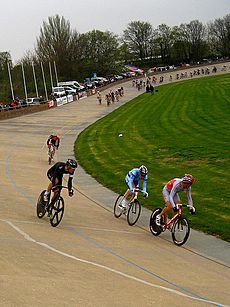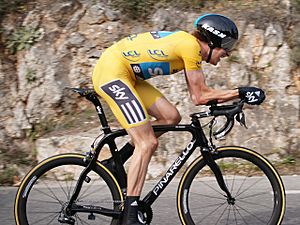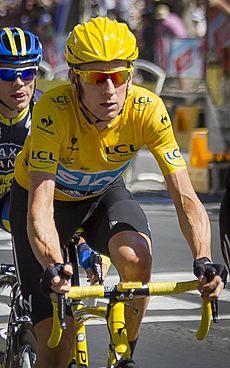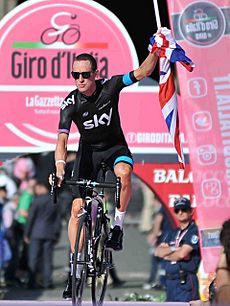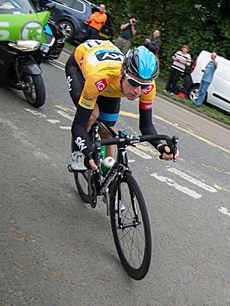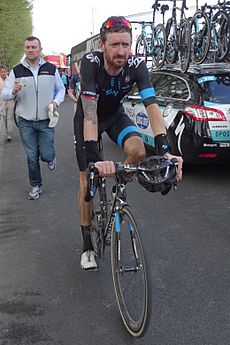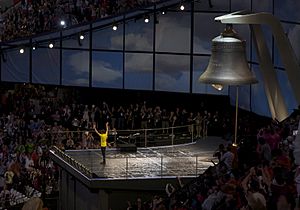Bradley Wiggins facts for kids
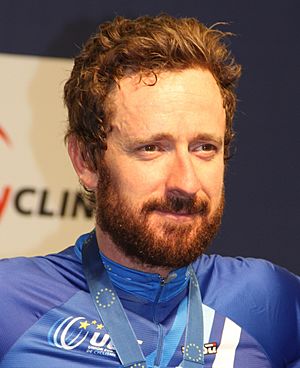
Wiggins at the 2015 UEC European Track Championships
|
|||
| Personal information | |||
|---|---|---|---|
| Full name | Bradley Marc Wiggins | ||
| Nickname | Wiggo | ||
| Born | 28 April 1980 Ghent, Flanders, Belgium |
||
| Height | 1.90 m (6 ft 3 in) | ||
| Weight | 69 kg (152 lb; 10 st 12 lb) | ||
| Team information | |||
| Current team | Retired | ||
| Role | Rider | ||
| Rider type | Individual pursuit Time trialist All-rounder |
||
| Major wins | |||
|
|||
Sir Bradley Marc Wiggins (born 28 April 1980) is a British former professional road and track racing cyclist. He competed professionally from 2001 to 2016. He started his cycling journey on the track. Later, he switched to road cycling.
Bradley Wiggins won world titles in four different cycling events. He also won Olympic gold medals in three events. He is the only cyclist to win both World and Olympic championships on the track and the road. He also won the famous Tour de France race. He wore the leader's jersey in all three major cycling Grand Tours. He also held the world record in team pursuit several times.
He won a gold medal at four Olympic Games in a row, from 2004 to 2016. He held the record for Great Britain's most decorated Olympian with 8 medals. This record was later broken by Jason Kenny in 2021. Bradley Wiggins is the only rider to win both the Tour de France and an Olympic Gold medal in the same year (2012). He achieved this just one week apart!
Bradley Wiggins was born in Ghent, Belgium. His father, Gary Wiggins, was an Australian cyclist. His mother was British. Bradley moved to London when he was two years old. He focused on track cycling until 2008. Between 2000 and 2008, he won ten medals at the UCI Track Cycling World Championships. Six of these were gold medals.
His first Olympic medal was a bronze in the team pursuit at the Sydney 2000 Games. He then won three medals, including a gold in the individual pursuit, at the Athens 2004 Games. At the Beijing 2008 Games, he won two gold medals in the individual and team pursuit.
Bradley Wiggins became a professional road cyclist in 2001. He started focusing more on road cycling from 2008. He was known as a specialist in time trials. He also showed his skills in stage races. He finished fourth in the 2009 Tour de France. Later, he was moved up to third place after Lance Armstrong's results were cancelled in 2012.
In 2010, he joined the new British team Team Sky. In 2011, he won his first major stage race, the Critérium du Dauphiné. He also finished third in the Vuelta a España, later promoted to second. In 2012, Wiggins won the Paris–Nice, the Tour de Romandie, and the Critérium du Dauphiné. He then became the first British cyclist to win the Tour de France. He also won the time trial at the 2012 Summer Olympics.
In 2014, he won gold in the time trial at the road world championships. He also started his own cycling team, WIGGINS. Wiggins returned to track cycling at the 2014 Commonwealth Games. In June 2015, he set a new Hour record by cycling 54.526 km (33.881 mi). In 2016, he won another world championship in the madison. He also won gold in the team pursuit at the Olympics. This was his fifth time winning a medal at the Games. He retired from professional cycling on 28 December 2016.
Wiggins received an award called CBE in 2009. After his success in 2012, he received more honors. These included the Vélo d'Or award for best rider of the year. He also won the BBC Sports Personality of the Year Award. He was made a knight in 2013.
Contents
- Early Life and First Races
- Professional Cycling Career
- 2001–2004: Starting Out
- 2005–2007: Road Racing Focus
- 2008: Back to the Track
- 2009: Tour de France Success
- 2010: Joining Team Sky
- 2011: Dauphiné and Vuelta Success
- 2012: Tour de France and Olympic Gold
- 2013: Giro d'Italia and Tour of Britain
- 2014: World Time Trial Champion and Track Return
- 2015: Paris–Roubaix, WIGGINS Team, and Hour Record
- 2016: Fifth Olympic Gold and Retirement
- Life Outside Cycling
- Career Achievements
- See also
Early Life and First Races
Bradley Wiggins was born on 28 April 1980 in Ghent, Belgium. His father, Gary Wiggins, was a professional cyclist. His mother, Linda, was British. His father left the family when Bradley was two years old. Bradley moved with his mother to London. He went to St Augustine's junior school and then St Augustine's Church of England High School. He has a younger half-brother named Ryan.
Football was Bradley's first favorite sport. He was a fan of Arsenal. He discovered cycling when his mother told him to watch the 1992 Summer Olympics in Barcelona. She explained that his father had been good at one of the cycling events. Bradley watched the rest of the Olympics and fell in love with cycling.
In 1992, when he was 12, he entered his first race. It was called the West London Challenge 92. He later broke his collarbone in a road accident. He used the money he received as compensation to buy his first racing bicycle. He joined the Archer Road Club, where his father had also been a member. He raced at Herne Hill Velodrome and around Crystal Palace National Sports Centre. He was inducted into the London Youth Games Hall of Fame in 2010.
At 16, he won a one-kilometer time trial at the 1996 junior national track championships. He was invited to train at Manchester Velodrome. After school, he started a business studies course but left to focus on cycling. In 1997, he won several junior national track championships. He was the only British cyclist at the 1997 junior track world championships in Cape Town.
His big moment came in June 1998. He won the three-kilometer individual pursuit at the junior track world championships in Cuba. He was 18 years old. The next week, he won his titles again at the junior national track championships. He represented England at the 1998 Commonwealth Games in Kuala Lumpur. He won a silver medal in the team pursuit, which was his first senior medal. He became a full-time athlete, supported by the National Lottery.
In 1999, he started training with the Great Britain team pursuit squad. He rode the PruTour, now known as the Tour of Britain. In October, he competed in the track world championships in Berlin. He won a bronze medal in the team pursuit at the 2000 Summer Olympics in Sydney. In October 2000, he won silver in the team pursuit at the track world championships in Manchester.
Professional Cycling Career
2001–2004: Starting Out
In 2001, Bradley Wiggins joined the Linda McCartney Racing Team. This was a British professional road cycling team. However, the team soon closed down. He then raced for the British national team. He won the overall title in the Cinturón a Mallorca and Flèche du Sud. In September, he crashed his bike and needed metal pins in his wrist. Two weeks later, he competed at the track world championships and won silver in the team pursuit.
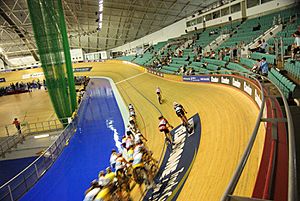
In 2002, he joined the French team Française des Jeux. He moved to Nantes, France, but felt homesick. At the 2002 Commonwealth Games in Manchester, he won two silver medals. At the track world championships in Copenhagen, he won a bronze medal in the team pursuit. Wiggins was not happy with his individual pursuit result. Chris Boardman, a retired cyclist, became his mentor.
In May 2003, Wiggins raced in his first major Grand Tour, the Giro d'Italia. He was removed from the race on the 18th stage for finishing too slowly. In the summer, he competed in the track world championships in Stuttgart. He won his first senior world title in the individual pursuit. He also won a silver medal in the team pursuit. In September, he won a stage in the Tour de l'Avenir. In November, he won the Six Days of Ghent race with Matthew Gilmore.
Wiggins joined Crédit Agricole for the 2004 season. He trained for the 2004 Summer Olympics in Athens. He won the gold medal in the individual pursuit. He also won a silver medal in the team pursuit. Then, with Rob Hayles, he won a bronze medal in the Madison race. Wiggins was the first British athlete in 40 years to win three medals at one Olympic Games. In December 2004, he received an award called Officer of the Order of the British Empire (OBE).
2005–2007: Road Racing Focus
In 2005, Wiggins wanted to focus more on road cycling. In April, he won a time trial stage in the Circuit de Lorraine. In September, he won his first race stage since 2001 at the Tour de l'Avenir. He finished 123rd overall in the Giro d'Italia. He came seventh in the time trial at the road world championships. He joined Cofidis for the 2006 season. He finished his first Tour de France in 124th place.
In March 2007, Wiggins returned to the track for the track world championships. He won gold in the individual pursuit. He then won gold in the team pursuit. On the road, he won a stage in the Four Days of Dunkirk. He also won the prologue of the Critérium du Dauphiné Libéré. He competed in the Tour de France. On stage six, he rode alone for a long time and won the combativity award. His team later left the race due to a doping issue with another rider. Wiggins was very upset about this.
Despite this, Wiggins continued racing for Cofidis. In August, he won a time trial stage in the Tour du Poitou-Charentes. In September, he won the Duo Normand with teammate Michiel Elijzen. His road season ended at the road world championships. He finished tenth in the time trial. In September, he signed with T-Mobile Team for the 2008 season. He joined Mark Cavendish to form a partnership in the Madison.
2008: Back to the Track
In 2008, Wiggins focused on track cycling and the 2008 Summer Olympics in Beijing. He decided not to race in the Tour de France. In February, he trained in the United States. He rode the Tour of California and finished second in the prologue.
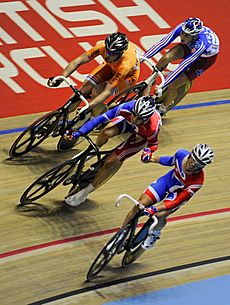
In March, Wiggins competed in the track world championships in Manchester. He won his third world title in the individual pursuit. He then won the team pursuit, setting a new world record. He also won the Madison with Mark Cavendish.
Wiggins then rode the Tour de Romandie and the Giro d'Italia. These races helped him prepare for the Olympics. At the Giro, he helped Cavendish win two stages. Wiggins finished 134th overall in the race.
At the Olympics, he defended his title in the individual pursuit. He set a new Olympic record. He won gold in the final, becoming the first rider to successfully defend an Olympic pursuit title. He was part of the team pursuit that broke the world record. The team won the gold medal, setting another new world record. He raced with Cavendish in the Madison, but they finished ninth.
In September, Wiggins joined the American team Garmin–Slipstream for the 2009 season. In December, he finished ninth in the BBC Sports Personality of the Year Award. He was also part of the British cycling team that won the Team of the Year Award. In December, he received another award, Commander of the Order of the British Empire (CBE).
2009: Tour de France Success
Wiggins changed his focus to road cycling. He moved with his family to Girona, Spain. In February, he helped his team win the opening team time trial of the Tour of Qatar. In March, he finished second in a time trial at Paris–Nice. In April, he won a time trial on the final stage of the Three Days of De Panne. He also had good finishes in classic races like Gent–Wevelgem and Paris–Roubaix. After finishing the Giro d'Italia, he won the Beaumont Trophy. This race helped him prepare for the Tour de France.
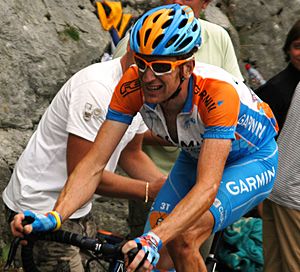
Wiggins had lost weight for the Tour de France. He finished third in the time trial on stage one. He helped his team finish second in stage four's team time trial. On stage seven, he finished 12th in the first mountain finish. He was in fifth place overall at the start of the second week. On stage fifteen, he finished fifth, moving up to third place overall. He finished second in the time trial on stage 19. He ended the Tour in fourth place. In October 2012, he was moved up to third place overall after Lance Armstrong's results were cancelled. This made him the first British rider to finish on the podium in the Tour de France.
In September, Wiggins won the national time trial championship. He also competed at the road world championships. He was on track for a bronze medal but had a bike problem. He finished 21st. In October, he won the Herald Sun Tour in Australia. He led the race after winning the time trial on stage five.
Wiggins was supposed to ride for Garmin Slipstream again in 2010. However, on 10 December, it was announced that he would join Team Sky. He signed a four-year contract with the new British team.
2010: Joining Team Sky
In 2010, Wiggins became a team leader for the first time. His main goal was to win the Tour de France. In February, he helped his team win the opening team time trial of the Tour of Qatar. He then took second place in a time trial at the Vuelta a Andalucía. In March, he finished third overall at the Vuelta a Murcia.
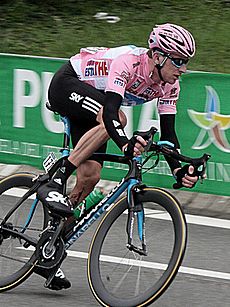
In May, Wiggins won his first Grand Tour stage in Amsterdam. This was the opening time trial of the Giro d'Italia. He became the second British cyclist to wear the pink jersey. He finished 40th overall in the race. He later said he was not physically fit during the race.
Wiggins then went to a training camp in the Alps for the Tour de France. He had a difficult start in the Tour. He finished 77th in the prologue. On stage eight, the first mountain finish, he could only manage 19th place. He lost more time on the following day. He finished the Tour in 24th place. In February 2012, his position was upgraded to 23rd after another rider was found guilty of doping.
He returned to racing in August at the GP Ouest–France. In September, he won his national time trial championship again. He finished the season at the Tour of Britain. His season ended at the Giro di Lombardia when he crashed. He trained with the Great Britain squad over the winter.
2011: Dauphiné and Vuelta Success
Wiggins was still the team leader for Team Sky in 2011. He decided not to race in the Giro d'Italia. Instead, he focused on shorter races and training for the Tour de France. His season began in February at the Tour of Qatar. He then won the team pursuit at a World Cup Classics event in Manchester. In March, he finished second in a time trial at the Paris–Nice. He finished third overall in that race. In April, he rode Paris–Roubaix and the Tour de Romandie. In May, he won a time trial stage at the Bayern Rundfahrt.
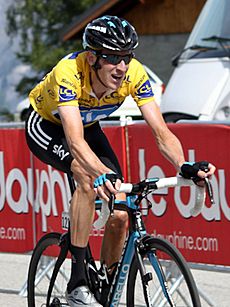
He then went for altitude training in the Alps. He took the overall lead in the Critérium du Dauphiné after finishing second in a time trial. Wiggins kept his lead and won the race. This was his biggest victory on the road at that time. In June, Wiggins won the national road race championship. On the seventh stage of the Tour de France, Wiggins crashed and had to leave the race with a broken collarbone.
After recovering, Wiggins raced in the Vuelta a España for the first time. He also competed in the road world championships. He had a difficult start to the Vuelta. However, a strong first week brought him back into the race. On stage nine, Wiggins and teammate Chris Froome attacked and gained time on rivals. Wiggins was expected to take the lead in the time trial the next day. He eventually took the lead after a rest day. Wiggins finished the Vuelta in third place. In July 2019, he was moved up to second place after another rider was found to have violated anti-doping rules.
In September, he competed in the road world championships in Copenhagen. He won the silver medal in the time trial. Four days later, he helped the Great Britain team win the road race.
2012: Tour de France and Olympic Gold
In 2012, Wiggins continued to focus on road racing. He started his season with third place in the Volta ao Algarve. He won the final time trial in that race.
In March, Wiggins finished second in the opening time trial of the Paris–Nice. He took the lead the next day. He held the lead for the rest of the race, winning the final stage. He became the first British rider to win the race since Tom Simpson in 1967. His win also gave him the points classification.
On stage one of the Tour de Romandie in April, Wiggins won a rare sprint victory. He lost the leader's jersey for a short time. However, he won the final time trial to take the overall victory. He became the first Briton to win that race in its 65-year history.
In June, Wiggins competed in the Critérium du Dauphiné. He started by finishing second in the prologue. He took the overall lead the next day. Wiggins won the fourth stage of the race, a time trial. He held the lead until the end, winning by over a minute.
Wiggins was a favorite to win the Tour de France. He started the Tour with second place in the prologue. He took over the yellow jersey on stage seven. He became the fifth British rider to wear the jersey. Wiggins won the time trial on stage nine. He extended his lead on stage 11.
During stage fourteen, a spectator threw tacks onto the road. Several riders got flat tires, including the defending champion. Wiggins and his team did not get a flat. Wiggins then had his teammates slow down to let the other riders catch up. This was seen as a very kind act of sportsmanship. Wiggins was called "Le Gentleman" (The Gentleman) because of it. On stage 16, Wiggins and Froome followed attacks from a rival. On stage 17, Froome and Wiggins finished second and third. Wiggins won the time trial on stage 19. This gave him a big lead at the start of the final stage. On that stage, Wiggins helped teammate Cavendish win. Wiggins confirmed his own overall victory. Wiggins became the first person to win the Paris–Nice, Tour de Romandie, Critérium du Dauphiné, and Tour de France in one season.
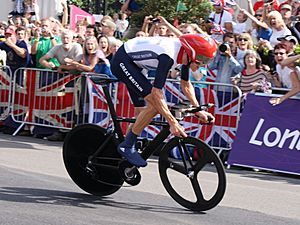
Wiggins was chosen for two road cycling events at the 2012 Summer Olympics in London. These were the time trial and the road race. Wiggins finished 103rd in the road race. Wiggins won gold in the time trial. By doing so, he became the most decorated British Olympian with seven medals. This record was later shared with Sir Chris Hoy. Wiggins entered the Guinness World Records. He was the first cyclist to win an Olympic gold medal and the Tour de France in the same year.
Wiggins returned to racing at the Tour of Britain in September. He had to pull out due to a stomach bug. The road race at the road world championships was his last race of the season. In October, he received the Vélo d'Or trophy. In November, he was in a road accident but only had minor injuries. In December, he won the BBC Sports Personality of the Year Award. Wiggins was made a knight in 2013 for his services to cycling.
2013: Giro d'Italia and Tour of Britain
Many people expected Wiggins to defend his Tour de France title in 2013. However, he said his main focus would be the Giro d'Italia. After that, he would support teammate Froome in the Tour de France. In April, he mentioned he wanted to win another Tour. He hoped to win both the Tour and Giro in the same year.
Wiggins trained in Mallorca. His first race of the season was the Tour of Oman in February. He helped Froome win the overall classification in that race. Wiggins did not defend his title at the Paris–Nice. Instead, he trained in Tenerife. He returned to racing at the Volta a Catalunya in March. He finished fifth overall.
In April, Wiggins rode the Giro del Trentino to prepare for the Giro d'Italia. He lost time on the first day due to a breakaway. However, his team won the team time trial later that day. He finished the race in fifth place.
Wiggins was one of the favorites for the Giro d'Italia. His team won the stage two team time trial. On stage four, Wiggins lost time due to a crash. On a wet stage seven, Wiggins crashed on a descent. He finished 90 seconds behind the leaders. In the following stage, a time trial, Wiggins placed second. Wiggins struggled on wet roads on stage nine. After stage 11, Wiggins said he had a chest infection. He left the race the next day.
It was announced on 31 May that Wiggins had a knee injury. This forced him to miss defending his title in the Tour de France. He later suggested he might not ride the Tour again. He returned to racing at the Tour de Pologne. He won stage seven's time trial.
In September, Wiggins led Team Sky at his home race, the Tour of Britain. He won the time trial on stage three. He held the lead for the rest of the week to win the race for the first time. The following week, at the world championships, he won the silver medal in the time trial. Wiggins also raced in the road race but did not finish.
2014: World Time Trial Champion and Track Return
Wiggins said his main goals for 2014 were the Paris–Roubaix race, the Tour of California, and the road world championships. He also planned to support Chris Froome in the Tour de France.
Wiggins rode the Tour of Flanders and finished 32nd. Wiggins competed in Paris–Roubaix for the first time since 2011. He finished ninth, which was his only top ten finish in a major classic race.
At the Tour of California, Wiggins won the time trial on stage two. He took the overall lead and kept it for the rest of the race. Despite this good result, Wiggins was not chosen for the Tour de France. This led him to return to track cycling. He prepared for the Commonwealth Games in Glasgow.
At the Commonwealth Games in July, Wiggins won the silver medal in the team pursuit. The next day, Wiggins said he was "done with the road." He said he would likely never ride a Grand Tour again. He wanted to focus on preparing for the team pursuit at the 2016 Summer Olympics.
In September, Wiggins rode the Tour of Britain. He won the final time trial in London. He finished the race in third place overall. Wiggins then won gold in the time trial at the world road championships in Spain.
2015: Paris–Roubaix, WIGGINS Team, and Hour Record
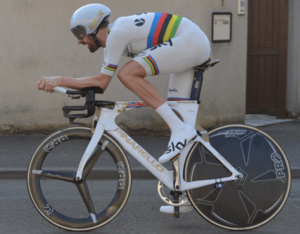
In January 2015, Wiggins signed a contract extension with Team Sky until April 2015. His goal was to win Paris–Roubaix. After that, he would join his new team, WIGGINS, to prepare for the 2016 Olympics. It was also confirmed that he would try to break the hour record in 2015. In March, he said he would race with his new team at the first Tour de Yorkshire.
Early in the season, Wiggins rode the Tour of Qatar. He finished third in the individual time trial stage. Wiggins then took part in the Omloop Het Nieuwsblad race.
Wiggins returned to Paris–Nice, a race he won in 2012. He finished 12th in the prologue. He later withdrew from the race before the final mountain time trial.
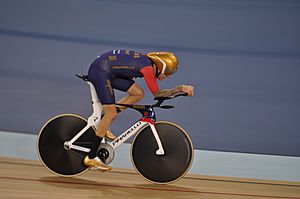
Wiggins was supposed to ride E3 Harelbeke in March. However, he withdrew from that race. Instead, he rode Gent–Wevelgem but abandoned the race due to bad weather. During the Three Days of De Panne, Wiggins helped his team's sprinter. He then won the final stage's short time trial. This was expected to be his last race with Team Sky.
At Paris–Roubaix, Wiggins's last race with Sky, he finished 18th. He attacked with 30 km (18.6 mi) left but was caught by the main group. A few days later, it was announced that Wiggins would try to break the hour record on 7 June. He raced in the Tour de Yorkshire with Team WIGGINS. On 7 June 2015, Wiggins broke the hour record. He rode 54.526 km (33.881 mi).
Paris–Roubaix marked the end of Wiggins's main road cycling career. His road career was shorter than usual for a professional. His high finish in the 2009 Tour de France led him to join Team Sky. He had a difficult first season there. However, from 2011 to 2015, he had many successes. These included world and Olympic time trial titles. He also won the Tour de France and a podium place in the Vuelta a Espana in 2011. He won many major one-week stage races between 2011 and 2013. By 2014, his teammate Chris Froome had become the main leader at Sky. This encouraged Wiggins to return to track cycling. He aimed for one last Olympic gold medal.
On 16 August, Wiggins raced with Cavendish on the track for the first time since the 2008 Olympics. They won the Madison race. In October, Wiggins won his first gold medal at the European track championships. He was part of the British squad that won the team pursuit.
2016: Fifth Olympic Gold and Retirement
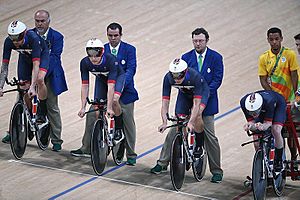
Wiggins competed at the world championships in London. He won two medals. In the team pursuit, his team won silver. Wiggins said he was happy with his performance. He then raced with Cavendish in the madison. They won their second world title together in this event.
In spring 2016, Wiggins focused on training for the Olympics. He raced in only a few road events. As part of the team pursuit squad, Wiggins was reportedly breaking world records in training. The team pursuit squad achieved the fastest time in qualification for the Olympics. They then reached the final with a world record time. In the final, Great Britain defeated Australia. This brought Wiggins his eighth Olympic medal and his fifth gold. Wiggins then announced he planned to retire after the Six Days of Ghent in November. He planned to expand his activities in supporting Team Wiggins. In his second-to-last race, the Six Days of London, Wiggins placed second with Cavendish. The pair then won his final event, the Six Days of Ghent. On 28 December 2016, he announced his retirement from professional cycling. He said, "2016 is the end of the road for this chapter, onwards and upwards, 'feet on the ground, head in the clouds' kids from Kilburn don't win Olympic Golds and Tour de Frances! They do now."
Life Outside Cycling
Family Life
Wiggins was married to Catherine Cockram. They met during the 2002 Commonwealth Games. They have two children, Ben and Isabella. Ben is also a racing cyclist. He has had success at the junior level. Their family lived in Eccleston, Lancashire. In May 2020, it was announced that Wiggins and his wife had separated.
Wiggins had a difficult relationship with his father, Gary Wiggins. His father left the family when Bradley was two years old. Bradley only knew his father had been a professional cyclist. They first met in 1999 when Bradley was training in Australia. Bradley became disappointed with his father's problems. They never met again. Gary Wiggins passed away in 2008.
Interests and Activities
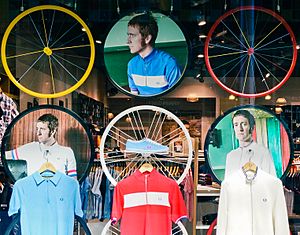
Wiggins is known for his love of mod culture. He collects classic motor scooters and guitars from the 1960s and 1970s. He enjoys playing guitar. In December 2012, he played guitar at a Paul Weller charity concert. They also recorded a special radio show about their love of music. He supports Liverpool Football Club and Wigan Warriors rugby league club.
In July 2012, it was announced that Wiggins would work with the Fred Perry clothing label. They would create a range of cycling clothes. This clothing line was launched in July 2012.
Also in 2012, Wiggins started the Bradley Wiggins Foundation. Its goal was to encourage people to get into sports and exercise. The foundation supported a professional women's cycling team. However, in February 2015, Wiggins announced that the Foundation would close down.
In August 2019, Wiggins said he wanted to become a social worker. He started studying for a degree. He said his upbringing gave him "mental toughness" to help others.
Other Public Appearances
At the 2012 Olympics, Wiggins rang the Olympic Bell. This marked the start of the opening ceremony.
Wiggins has written several books about his career. These include In Pursuit of Glory (2008), On Tour (2010), The Bradley Wiggins Opus (2012), My Time (2012), and My Hour (2015). In 2013, My Story was published, which is a simpler version of My Time for younger readers. In 2018, he added a seventh book, Icons, about riders who inspired him.
In March 2014, Wiggins appeared as himself in an episode of a radio show called The Archers. This was for a charity event. Two years later, he appeared in a comedy sketch for Sport Relief 2016.
A sculpture inspired by Wiggins was unveiled in 2014. It is at St Augustine's CE High School, his old school.
In January 2017, Wiggins was a contestant on a TV show called The Jump. However, he had to leave the show after breaking his leg during training.
In June 2017, Wiggins said he had started rowing seriously. He planned to compete in the British Indoor Rowing Championships. He finished 21st in the elite 2000m race.
In 2018, Wiggins launched The Bradley Wiggins Show. This was a cycling podcast. The show was very popular and was renewed for more episodes. He also started working as a commentator for Eurosport.
In July 2019, Comedy Central announced a gameshow called Gods of the Game. Wiggins co-hosted the show. It featured members of the public competing against famous athletes.
Career Achievements
Major Results
Sources:
Road Cycling
- 2000
- 7th Overall Circuit des Mines
- 2001
- 1st
 Overall Cinturón a Mallorca
Overall Cinturón a Mallorca
- 1st Stages 1 (ITT) & 2
- 1st
 Overall Flèche du Sud
Overall Flèche du Sud
- 1st Stage 1
- 3rd Overall International Tour of Rhodes
- 9th Lincoln International GP
- 10th Overall Circuit des Mines
- 2003 (1 win)
- 1st Stage 1 (ITT) Tour de l'Avenir
- 5th Overall Tour du Poitou-Charentes
- 2005 (1 win)
- 1st Stage 8 Tour de l'Avenir
- 4th Overall Circuit de Lorraine
- 1st Stage 2 (ITT)
- 7th Time trial, UCI World Championships
- 7th LuK Challenge Chrono (with Christophe Moreau)
- 2007 (4 wins)
- 1st Duo Normand (with Michiel Elijzen)
- 1st Prologue Critérium du Dauphiné Libéré
- 1st Stage 1 (ITT) Four Days of Dunkirk
- 1st Stage 4 (ITT) Tour du Poitou-Charentes
- 10th Time trial, UCI World Championships
 Combativity award Stage 6 Tour de France
Combativity award Stage 6 Tour de France- 2009 (4 wins)
- 1st
Time trial, National Championships
- 1st
 Overall Herald Sun Tour
Overall Herald Sun Tour
- 1st Stage 5 (ITT)
- 1st Beaumont Trophy
- 1st Stage 3b (ITT) Three Days of De Panne
- 1st Stage 1 (TTT) Tour of Qatar
- 3rd Overall Tour de France
- 2010 (2 wins)
- 1st
Time trial, National Championships
- Giro d'Italia
- 1st Stage 1 (ITT)
- Held
 after Stage 1
after Stage 1
- 1st Stage 1 (TTT) Tour of Qatar
- 3rd Overall Vuelta a Murcia
- 2011 (3 wins)
- 1st
Road race, National Championships (Beaumont Trophy)
- 1st
 Overall Critérium du Dauphiné
Overall Critérium du Dauphiné - 1st Stage 4 (ITT) Bayern Rundfahrt
- 2nd
 Time trial, UCI World Championships
Time trial, UCI World Championships - 2nd Overall Vuelta a España
- Held
 after Stages 11–15
after Stages 11–15
- Held
- 3rd Overall Paris–Nice
- 9th UCI World Tour
- 2012 (12 wins)
- 1st
 Time trial, Olympic Games
Time trial, Olympic Games - 1st
 Overall Tour de France
Overall Tour de France
- 1st Stages 9 (ITT) & 19 (ITT)
- 1st
 Overall Paris–Nice
Overall Paris–Nice
- 1st
 Points classification
Points classification - 1st Stage 8 (ITT)
- 1st
- 1st
 Overall Tour de Romandie
Overall Tour de Romandie
- 1st Stages 1 & 5 (ITT)
- 1st
 Overall Critérium du Dauphiné
Overall Critérium du Dauphiné
- 1st Stage 4 (ITT)
- 2nd UCI World Tour
- 3rd Overall Volta ao Algarve
- 1st Stage 5 (ITT)
- 2013 (3 wins)
- 1st
 Overall Tour of Britain
Overall Tour of Britain
- 1st Stage 3 (ITT)
- 1st Stage 7 (ITT) Tour de Pologne
- 1st Stage 2 (TTT) Giro d'Italia
- 2nd
 Time trial, UCI World Championships
Time trial, UCI World Championships - 5th Overall Giro del Trentino
- 1st Stage 1b (TTT)
- 5th Overall Volta a Catalunya
- 2014 (5 wins)
- 1st
 Time trial, UCI World Championships
Time trial, UCI World Championships - 1st
Time trial, National Championships
- 1st
 Overall Tour of California
Overall Tour of California
- 1st Stage 2 (ITT)
- 3rd Overall Tour of Britain
- 1st Stage 8a (ITT)
- 9th Paris–Roubaix
- 2015 (1 win)
- 3rd Overall Three Days of De Panne
- 1st Stage 3b (ITT)
Grand Tour Results
| Grand Tour general classification results timeline | |||||||||||||||||||
| Grand Tour | 2003 | 2004 | 2005 | 2006 | 2007 | 2008 | 2009 | 2010 | 2011 | 2012 | 2013 | 2014 | 2015 | ||||||
|---|---|---|---|---|---|---|---|---|---|---|---|---|---|---|---|---|---|---|---|
| DNF | — | 123 | — | — | 134 | 69 | 40 | — | — | DNF | — | — | |||||||
| — | — | — | 121 | DNF | — | 3 | 23 | DNF | 1 | — | — | — | |||||||
| — | — | — | — | — | — | — | — | 2 | — | — | — | — | |||||||
| Major stage race general classification results timeline | |||||||||||||||||||
| Race | 2003 | 2004 | 2005 | 2006 | 2007 | 2008 | 2009 | 2010 | 2011 | 2012 | 2013 | 2014 | 2015 | ||||||
| 80 | DNF | DNF | 71 | — | — | DNF | — | 3 | 1 | — | — | DNF | |||||||
| — | — | — | — | — | — | — | — | — | — | — | 53 | — | |||||||
| — | — | — | — | 138 | — | — | — | — | DNF | 5 | — | — | |||||||
| — | — | — | — | — | — | — | 33 | — | — | — | — | — | |||||||
| DNF | — | — | — | — | 105 | — | — | 62 | 1 | — | — | — | |||||||
| — | — | — | 85 | 95 | — | — | — | 1 | 1 | — | — | — | |||||||
| — | 99 | — | — | — | — | — | — | — | — | — | DNF | — | |||||||
Monument Race Results
| Monument | 2002 | 2003 | 2004 | 2005 | 2006 | 2007 | 2008 | 2009 | 2010 | 2011 | 2012 | 2013 | 2014 | 2015 |
|---|---|---|---|---|---|---|---|---|---|---|---|---|---|---|
| Milan–San Remo | — | 98 | — | 88 | 46 | — | — | 108 | — | 44 | — | — | — | — |
| Tour of Flanders | DNF | 50 | DNF | 81 | DNF | — | — | — | — | — | — | — | 32 | 87 |
| Paris–Roubaix | — | DNF | DNF | DNF | 49 | — | — | 25 | — | 90 | — | — | 9 | 18 |
| Liège–Bastogne–Liège | — | — | — | — | — | — | — | — | 71 | — | — | — | — | — |
| Giro di Lombardia | — | — | — | — | — | — | — | — | DNF | — | — | — | — | — |
Track Cycling
- 1998
- 1st
 Individual pursuit, UCI World Junior Championships
Individual pursuit, UCI World Junior Championships - National Junior Championships
- 1st
Points race
- 1st
Scratch
- 1st
- 2nd
 Team pursuit, Commonwealth Games
Team pursuit, Commonwealth Games - 1999
- 1st
Madison, National Championships (with Rob Hayles)
- 2000
- 2nd
 Team pursuit, UCI World Championships
Team pursuit, UCI World Championships - 3rd
 Team pursuit, Olympic Games
Team pursuit, Olympic Games - 3rd Six Days of Grenoble (with Rob Hayles)
- 2001
- 1st
 Individual pursuit, UEC European Under-23 Championships
Individual pursuit, UEC European Under-23 Championships - 2nd
 Team pursuit, UCI World Championships
Team pursuit, UCI World Championships - 2002
- Commonwealth Games
- 2nd Six Days of Ghent (with Matthew Gilmore)
- 3rd
 Team pursuit, UCI World Championships
Team pursuit, UCI World Championships - 2003
- UCI World Championships
- 1st Six Days of Ghent (with Matthew Gilmore)
- 2004
- Olympic Games
- 2007
- UCI World Championships
- UCI World Cup Classics
- 1st Individual pursuit, Manchester
- 1st Team pursuit, Manchester
- 1st Team pursuit, Sydney
- 1st Individual pursuit, Beijing
- 2nd Madison, Beijing (with Mark Cavendish)
- 2008
- Olympic Games
- UCI World Championships
- 2011
- 1st Team pursuit, UCI World Cup Classics, Manchester
- 2014
- 2nd
 Team pursuit, Commonwealth Games
Team pursuit, Commonwealth Games - 2015
- Hour record:
 54.526 km
54.526 km - 1st
 Team pursuit, UEC European Championships
Team pursuit, UEC European Championships - Revolution Series, Derby
- 1st Team pursuit
- 1st Madison (with Mark Cavendish)
Major Championships Results
| — | Did not compete |
|---|---|
| DNF | Did not finish |
| N/A | Race not held |
World Records
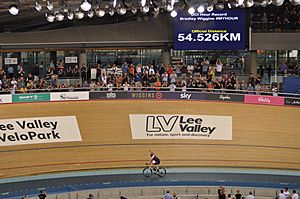
| Discipline | Record | Date | Event | Velodrome | Ref |
|---|---|---|---|---|---|
| Team pursuit | 3:56.322 | 27 March 2008 | World Championships | Manchester | |
| 3:55.202 | 17 August 2008 | Olympic Games | Laoshan (Beijing) | ||
| 3:53.314 | 18 August 2008 | ||||
| Hour record | 54.526 km | 7 June 2015 | — | Lee Valley (London) | |
| Team pursuit | 3:50.570 | 12 August 2016 | Olympic Games | Rio Olympic | |
| 3:50.265 |
Awards and Honors
- Cycling Weekly Cyclist of the Year: 2000
- Appointed Officer of the Order of the British Empire for services to sport: 2005 New Year Honours
- Appointed Commander of the Order of the British Empire for services to sport: 2009 New Year Honours
- London Youth Games Hall of Fame: 2010
- GQ Lifetime Achievement: 2012
- Vélo d'Or: 2012
- Sports Journalists' Association's Sportsman of the Year: 2012
- Cyclingnews.com Rider of the Year: 2012
- International Flandrien of the Year: 2012
- Bidlake Memorial Prize: 2012
- BBC Sports Personality of the Year: 2012
- Laureus World Sports Sportsman of the Year Award (nominated): 2013
- Appointed Knight Bachelor for services to cycling: 2013 New Year Honours
See also
 In Spanish: Bradley Wiggins para niños
In Spanish: Bradley Wiggins para niños
- 2012 Summer Olympics and Paralympics gold post boxes
- List of British cyclists
- List of British cyclists who have led the Tour de France general classification
- List of Grand Tour general classification winners
- List of multiple Olympic gold medalists at a single Games
- List of multiple Olympic gold medalists
- List of multiple Summer Olympic medalists
- List of Olympic medalists in cycling (men)
- List of people from Ghent
- List of sporting knights and dames
- World record progression track cycling – Men's team pursuit
- Yellow jersey statistics
 | Georgia Louise Harris Brown |
 | Julian Abele |
 | Norma Merrick Sklarek |
 | William Sidney Pittman |


